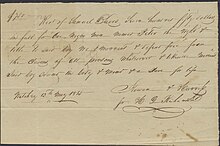Rowan & Harris
[4] The nature of the case was "In Rowan v. Runnels, the plaintiffs, John A. Rowan [sic] and John L. Harris, brought action to recover on a promissory note given them by the defendant, Hiram G. Runnels.
The only consideration in back of the note was certain slaves brought into Mississippi in 1836 and sold by the plaintiffs as merchandise.
This was the evidence presented in the lower court, and the jury was instructed to declare the note void if the slaves had been introduced into the State and sold after May 1, 1833.
Peter V. Daniel dissented, writing "that a state court interpretation of its own constitution should be binding on all.
[5] In 1841, Rice C. Ballard was the trustee listing for sale the 2,300-acre Bruinsburg plantation in Claiborne County and over 100 slaves (including 23 children under age eight) "to pay three promissory notes owed Rowan & Harris.
